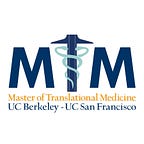Alumni Spotlight: Joshua Yang
MTM Alumni ’16, Cofounder of Glyphic Biotechnologies
How was the MTM curriculum and faculty mentorship valuable in influencing the direction and founding of Glyphic?
Before the MTM program, my background was in lab biology, bioengineering, and developing and designing novel technologies, but I didn’t know how to take what you develop in the lab to commercial potential and to the market, to benefit patients or the healthcare system. The program was my first exposure to that, with classes on intellectual property, regulatory affairs, and healthcare policy related to the US and Medicare. These were essential in understanding the entire healthcare landscape, so we could figure out how to position the product correctly: the capstone nature of the project integrated classes on IP, regulatory affairs, and reimbursement strategies for our specific project. Working with professors at both UC Berkeley and UCSF was very valuable.
What kind of capstone work have MTM students done with Glyphic Biotechnologies?
Glyphic is a protein sequencing startup. We are developing life sciences tools for proteomics, aiming to bring the same level of scale that DNA sequencing has brought to genomics, now to the world of proteomics. We started Glyphic back in 2021 and launched in the Baker Labs at UC Berkeley. In 2021 or 2022, we conducted a capstone project, offering students multiple areas to contribute. There were technical areas, like contributing to development and testing on our platform, as well as internal operations development. This included developing how we catalog and track experiments, workflows, project management aspects, and creating databases and trackers for timelines. Additionally, there was an external market and commercial research component. Students investigated competitors and the general landscape of the proteomics world, enabling us to better understand the competitive landscape.
Are there any notable outcomes or achievements that have resulted from these capstone projects?
For Glyphic specifically, it’s not necessarily our expectation that students are going to make a vast contribution. This is largely our way of trying to give back and provide opportunities. Working with the students, and providing career advice, my co-founder and our CTO Daniel, took a particular mentorship role for one of the students as she navigated potential career paths. Our success would be that we were able to help shape the career trajectories of the students in the program by giving the advice that we had or the wisdom that we had collected over our own experiences, going through graduate school and entrepreneurship.
What kinds of different perspectives and career trajectories did you see during your time with MTM?
I think it was a quite diverse class. One-third of the class were either pre-med or already doctors and were in residency doing this as their extracurricular residency program. Another third ended up going into biotech consulting. And another third ended up in industry, in startups, or in other types of biopharma medical device companies. It was quite broad. I think this was a huge benefit because there were a lot of different perspectives and we were all exploring various career options together.
What advice do you have for current students when selecting and developing their capstone projects, especially if they’re considering an entrepreneurial path like yours?
I think you should be very thoughtful about what project you select. The projects come at various stages. There are projects that are very nascent, with just an idea and the backing by a professor. Then it goes all the way to fairly well-established startups with specific projects that are part of a company but still present important technical or operational challenges. Students should think about what areas they want to learn the most about and take on before choosing a project. An entrepreneurial path can take many forms. You can launch your own company, join an early-stage startup, or continue in academia and be the professor who launches startups from your lab as a scientific co-founder. There are many routes to entrepreneurship, so you have to think about what you want to accomplish. Then you can tailor your project selection, the classes you take, and the professors and people you try to connect with accordingly.
